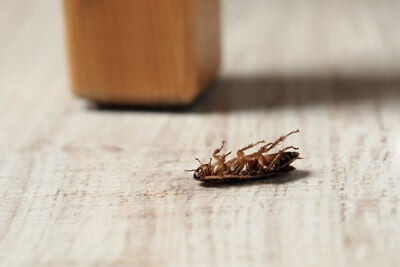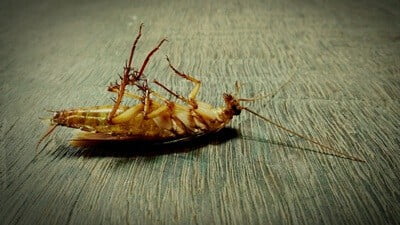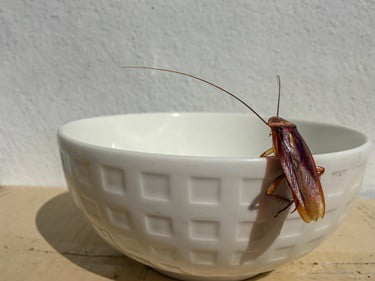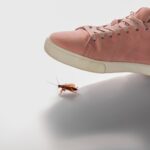Cockroaches are rumored to be invincible. They are certainly extremely resilient. Roaches can survive weeks without food or water, handle extreme temperatures, regrow limbs, and even live (temporarily) without a head. They are also resistant to radiation and almost impossible to drown. Knowing all of this, it’s not all that difficult to believe the myth that cockroaches can come back from the dead.
Roaches cannot come back to life but can play dead convincingly. If exposed to deadly circumstances, roaches may go into shock and remain immobile until they can move again. If you think you’ve killed a cockroach, but it begins to move a short time after, it was never really dead in the first place.
Instead, the roach might’ve held perfectly still to avoid attracting predators. When sprayed with insecticides, cockroaches may be stunned by the poison before recovering. Likewise, they can even freeze solid, only to thaw out later and regain all of their motor functions. Because of this, there are only a few ways to tell if a roach is playing dead.
Do Cockroaches Come Back from the Dead?
Roaches cannot return to life. However, there are many occasions where cockroaches will survive what should be fatal circumstances. That’s because roaches have incredible survival abilities. These include:
- Limb regeneration. A roach can regenerate its body parts. However, this doesn’t happen immediately.
- Holding its breath. This can be for over half an hour, and roaches don’t need much oxygen to survive.
- Temperature and radiation resistance. The most popular myth is that roaches can survive a nuclear bomb.
- The ability to survive (temporarily) without a head. A roach with no head will eventually die, but it won’t be from the brutality of the injury itself.
Despite cockroaches’ ability to heal themselves, they can’t recover from death. If a cockroach is properly killed, it cannot resurrect itself. However, you may be fooled into thinking you’ve killed a roach when you haven’t.
Do Cockroaches Pretend to Be Dead?
If you ever see an unmoving cockroach, don’t turn away. It just might be playing dead. This behavior is known as:
- Apparent death
- Playing possum
- Tonic immobility
It is an evolutionary trait that involves a creature pretending to be dead to deceive predators. Some cockroaches will do this willfully as a survival tactic. However, there are cases where it’s an involuntary action.
In these cases, it isn’t just a clever deception but a biological function. You won’t be able to scare the roach into giving up the ruse. As mentioned, this is known as a state of tonic immobility. While in this state, cockroaches are, for the most part, paralyzed. They will be unresponsive when stimulated.
Even if the roach wanted to, it would be unable to move. For all intents and purposes, this is a form of shock. You’re likely to encounter it after the roach has been faced with deadly conditions, such as being sprayed with insecticide.
Cockroaches can play dead for nearly a week. That is, if they are healthy and have sufficient food around them. However, they won’t last that long if they’ve been directly sprayed with insecticide. While the poison may take time to work, most pest-killing sprays can get through a roach’s exoskeleton. Once inside, the roach will die – deception or not.
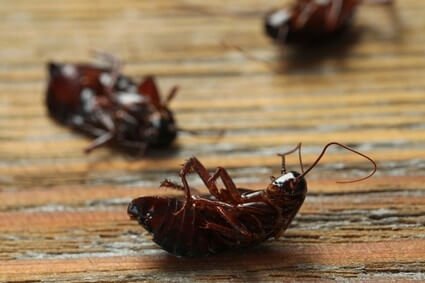
When Do Cockroaches Play Dead?
S,o when can you expect this behavior? Let’s explore the times you can expect a cockroach to pretend to be dead:
Extreme Temperatures
Being cold-blooded animals, cockroaches are not able to regulate their body temperature. They have to stay in climates where their preferred temperature is stable to survive. The coldest temperature cockroaches can endure is 15 degrees Fahrenheit. Anything below that temperature will cause them to freeze to death.
That’s why many of us like products like the Cockroach Freezing Jet. This is a canned spray that fires a stream of freezing cold -103 degree air. It will freeze cockroaches on the spot. A non-toxic pest control method involves:
- Capturing roaches
- Placing them in a sealed bag
- Putting them in the freezer
However, people have reported cockroaches coming back to life sometime after getting frozen solid. This can happen once the creatures begin to thaw out.
Extreme temperatures may freeze their exoskeleton but not their core. With canned sprays, the inner organs may be protected by the roach’s shell and prevent permanent damage. With freezer units, the roach’s exposure to cold may not be long enough to affect its vital organs.
Once the cockroach thaws, it will regain control over its body. With its core body unharmed, it will seek out warmer conditions.
Insecticides Meant To Paralyze
Many insecticides don’t actually kill roaches, let alone instantly. Instead, they force cockroaches to starve to death.
The vast majority of insecticides contain neurotoxins. This poison causes extensive damage to a cockroach’s nervous tissue. When sprayed, its neurotransmitters are compromised, causing its muscles to spasm. The violent tremors are what cause cockroaches to turn over and end up upside-down.
Roaches have a high center of gravity and carry most of their weight on their back. So, when a cockroach gets flipped over, it finds it difficult to get up. That’s most likely to happen on smooth, flat surfaces. Because they are unable to right themselves, cockroaches usually stay on their backs and starve.
As such, it can take up to 2 weeks for cockroaches to die once sprayed. However, one could manage to regain control of its muscles and latch on to something. With a solid grip, it can right itself and get away.
Insecticides Meant To Kill
On the flip side, some insecticides will poison cockroaches. If you use these, you may still find roaches playing dead. In these cases, they’re just stunned by the otherwise lethal dose to their body. They will freeze up and wait to recover for two reasons:
Body Structure
Sometimes, the neurotoxins don’t always fully poison the cockroach as they should. Cockroaches have the ability to close their airways. This can prevent the poison from getting inhaled into their organs. Cockroaches also have a resilient exoskeleton. If the poison can’t sink in past this shell, a roach can walk off the effects.
Natural Resistance
According to the journal Scientific Reports, cockroaches have developed a cross-resistance to insecticides. In one experiment, a group of cockroaches that were only 10% resistant to insecticides still increased in population.
The offspring of that initial group then became completely immune, despite never being exposed to the poison. To make matters worse, they were also unaffected by different mixtures of insecticides. It wasn’t just the one their parents were exposed to.
So, cockroaches can develop cross-resistance to insecticides in the span of a single generation. Given how fast they reproduce, grow, and infest an area, spraying insecticide on a cockroach isn’t always effective.
Being Crushed
If you stomp or smash a cockroach, you may assume the fight is over. On the contrary, many roaches will only be stunned by getting crushed. If you come back to remove its body, you may find the roach is gone.
Depending on the situation, cockroaches can withstand 300 to 900 times their own body weight, according to a study published by the journal Proceedings of the National Academy of Sciences. After the damaging experiments were over, cockroaches could run around and fly as they usually would. They showed no signs of tissue damage.
Originally, it was thought that a roach’s compressibility was due to its hard exoskeleton’s ability to bend. However, it’s due to their soft arthrodial membrane. These are the flexible areas located between an arthropod’s body.
After stomping on a cockroach, you may find you’ve stunned it enough for it to stop moving. However, if it runs away shortly after, it didn’t die and come back to life. You just didn’t stamp on the cockroach hard enough.
Losing Limbs
If you find limbs or larger body parts removed from the cockroach, you may be sure it’s dead. On the contrary, the roach may be regaining its wits and preparing to bolt.
If it’s placed in a state of tonic immobility, the cockroach may remain still. The trauma of losing a limb won’t impact its movement forever, though. Cockroaches are cold-blooded invertebrates with an open circulatory system. As such, they don’t bleed out when wounded. They can regenerate their limbs and muscle tissue by molting.
Like any other living organism, a cockroach can succumb to bacteria and infections, especially if wounded. However, this is unlikely due to all the antibacterial molecules located in their brains. It’s difficult for them to get an infection unless they’re too weak to fight it off.
Drowning
Cockroaches can’t swim, but it’s difficult for them to drown. So, if you happen to find one floating motionless in a bucket, don’t rejoice. It may have been forced to tread water before giving up. It will then hold still until it can find a way out. This is to conserve energy and avoid drawing attention from nearby predators.
Cockroaches can hold their breath for 40 minutes when fully submerged under water due to the small holes in each segment of their body called spiracles. The ability to close their spiracles means cockroaches can stay in water for long periods of time. They will effortlessly float by preventing water from entering their bodies.
How To Tell If A Cockroach Is Dead
So, what if you find a cockroach lying prone? What if you sprayed one with insecticide, and it appears to be holding still? Is it really dead, or are you being fooled? Here are ways to check if a roach is well and truly dead.
Check If There Are Other Roaches Nearby
Cockroaches have cannibalistic tendencies. If other cockroaches are surrounding the corpse, it is dead.

Touch It Very Carefully
With a pen, a gloved hand, or a shoe, poke the cockroach. Not the following:
- Never touch a roach with your bare hands.
- Have insecticide or a shoe on hand, just in case it latches on to whatever you’re using to touch it.
If it moves slightly but still doesn’t try to run, it is most likely pretending to be dead. Despite the temporary paralysis, a live cockroach’s nervous system is still active. It can, on occasion, respond to stimuli.
Check Where It Supposedly Died
If you found it floating in the water, there’s a possibility it’s not dead. If it’s near a food source, it’s most likely not dead either. Roaches could maintain tonic immobility for many days if they ate beforehand. Though they prefer organic foods, other sources can provide nutrients, such as:
Check The Nozzle of Your Insecticide Can
Roaches are more likely to die from inhaling poison. Just being covered in neurotoxin won’t always kill a roach.
To cause maximum damage, the bottle must have a nozzle that sprays a fine mist. This helps permeate through the closed spiracles and reach the nervous system. Some insecticides have nozzles that spray chunks. Those have a tendency to only stun a cockroach instead of fully poisoning it.
Cockroaches don’t come back to life if they’re actually dead. However, they’ve evolved in such a way that they may play dead. Roaches may also appear to have died because they’re temporarily stunned or immobilized.
